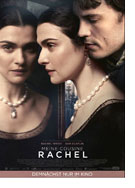

Opening 7 Sep 2017
Directed by:
Roger Michell
Writing credits:
Daphne Du Maurier, Roger Michell
Principal actors:
Rachel Weisz, Sam Claflin, Holliday Grainger, Iain Glen, Simon Russell Beale
An enigmatic gentlewoman in a crinoline skirt, a lovesick puppy, wealthy houses and picturesque scenery are the basis for the movie My Cousin Rachel.
Philip (Claflin) is the lovesick puppy adopted by his grown-up cousin Ambrose when he is orphaned as a little boy. The pair live happily together as gentlemen farmers while Philip grows up. When Ambrose becomes ill, his doctor suggests a move to warmer climes may ease his suffering. Soon Ambrose is convalescing in Italy, and Philip must rely on his neighbour Louise (Grainger) and her father Nick Kendall (Glen) for company.
Letters start arriving from Italy; Ambrose is feeling better; Ambrose is marrying the most delightful woman in the world; Ambrose is starting to find his wife difficult and tedious; Ambrose detests his wife and asks Philip for help. When Philip arrives at the villa near Florence, he finds it deserted and forlorn except for a shifty looking Italian Signor who informs him that his cousin is dead and his wife has disappeared. Philip returns home with a burning desire to discover what has happened to Ambrose and the whereabouts of his wife.
Philip’s lonely life on the farm continues until a letter arrives informing him that Ambrose’s widow plans on paying him a visit. Louise helps Philip prepare the house for the arrival of the lady whom he has decided is a monster. When the lovely widow Rachel (Weisz) arrives, Philip starts to revise his view of her. Louise and the other leading ladies in the area have the measure of Rachel in an instant, but Philip and his gentleman friends take quite another stance. Rachel is both foreign and worldly, which is a heady mixture for Philip to swallow.
By getting Philip to visit his cousin in an Italian villa with a view of Florence in the background and then having him show Rachel around the English countryside, director Roger Michell has given himself an opportunity to round out his movie (which is based on the novel My Cousin Rachel by Daphne du Maurier) and to add both beauty and substance to it. The plot may be high Victorian melodrama and predictable to modern minds, but sometimes there is nothing more enjoyable than losing oneself in a movie where actors flounce about in long skirts and take tea in gorgeous houses set in beautiful countryside. Suspend belief for a couple of hours, relax and enjoy the movie. (Jenny Mather)
Writer-director Roger Michell finesses the mystifying, sultry undercurrents of Daphne du Maurier’s 1951 same-titled dark romance novel with nefarious subtleties, distinct ambiguities, and a compelling cast. Set on a 19th century Cornish estate, du Maurier scrutinizes gender, illusion, and class through her inscrutable heroine. Her fait accompli was writing an ending left open to her reader/audiences’ interpretation.
Philip is taken by surprise at cousin Ambrose, who raised him, abruptly marrying, then aghast by Ambrose’s unanticipated death; his suspicions lock on the wife. Philip’s godfather (Glen) and daughter (Grainger), understanding the orphan’s struggle to adjust, are solicitous, patient. But, when cousin Rachel (Weisz) appears on Philip’s doorstep, his mission of revenge turns to curiosity and then more. She beguiles the houseman (Tim Barlow) and hounds, the estate’s hands and Parson (Havill) and family (Pepperdine, Friar, Pearce). Some rash decisions – against his godfather and family lawyer’s (Tristram Davies) advice – culminate with a judgment call only Philip—with time perhaps—can come to terms.
In tightly bound mourning clothes, Weisz’s enigmatic Rachel smolders with desire, charm and hints of being calculating. Claflin bolsters Weisz performance with his Philip: a solid, simple, foolish man whose naiveté dominates his integrity. Mike Eley’s arresting cinematography deftly depicts the textural subtlety in the production’s faithfulness to that era and the Cornish countryside, assisted by Kristina Hetherington’s editing and Rael Jones’ music. Did Daphne du Maurier have an inkling her novel would hold peoples imagination and interest decades later? Probably yes, since there was a 1952 film although du Maurier was unhappy with the script. BBC television (1983) and radio (2011) adaptations, and a 2012 dramatic adaptation followed. A physiological thriller if there ever was one, My Cousin Rachel’s ending is as much a mystery now as when first penned. Equally important, Michell’s spellbinding interpretation gives nothing away. (Marinell Haegelin)